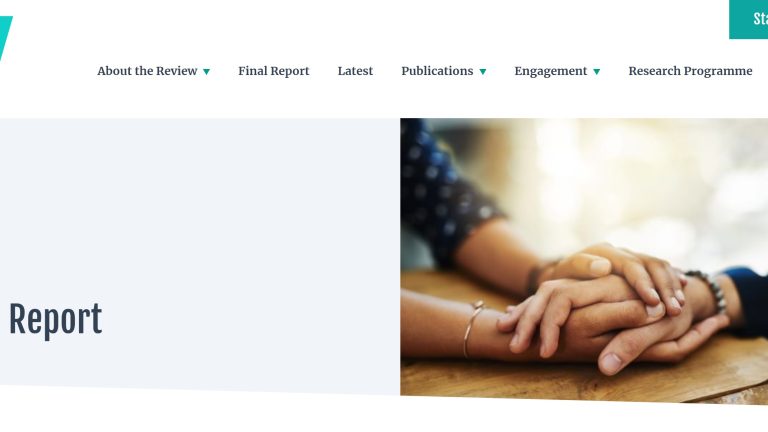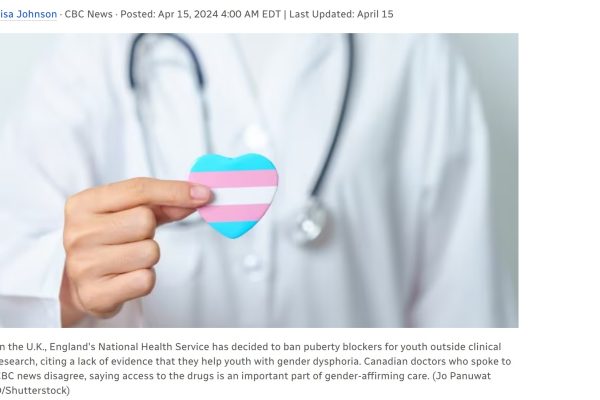The Cass Review Final Report was released on April 10, 2024. It can signficantly change how we approach children and young people with gender-related distress in Canada, if we let it.
Under the stewardship of Dr Hilary Cass, the Cass Review undertook a sweeping investigation of how children and young people are receiving care from the UK’s Gender Identity Services (GIDS). This task involved learning more about the people who are seeking help for gender incongruence from the health service, understanding the current state of the evidence supporting medical and psychosocial interventions that were being made available to this population and developing guidelines for care that take the complex pathways of identity formation into consideration.
Key Take Aways from the Review
We focus attention below on several aspects of the Cass Review work that apply to Canada and can have significant impact in terms of how “gender-affirmation” medicalization is viewed here.
The Review undertook 8 systematic reviews to assess the evidence supporting the use of puberty blockers and hormonal interventions, guideline quality, care pathways and the impact of social transition. This is a major contribution to the evidence base that can be leveraged throughout the world.
Significantly, these reviews discovered that the quality of evidence supporting medicalization options for gender-distressed youth is insufficient to justify the recommendation to use them on young people. Dr Hilary Cass commented in an interview about the Final Report, that other guidelines such as WPATH have made recommendations that are not based on evidence. WPATH is the guideline most often cited by Canadian provincial healthcare authorities as “evidence based”. It is no longer the standard by which treatment guidelines should be based.
The Review established that puberty blockers are not a “pause button” (as often promoted in Canada) as the vast majority (98%) of those who start puberty blockers move on to feminizing or masculinizing hormones as a next step. Rather than act as a “pause button” they may act to concretize a trans-identity and funnel youth down a medicalized pathway.
Risk of suicide is often promoted as the reason gender-affirmation treatments must be made available, but the Cass Report highlights that there is no evidence that gender affirmation interventions reduce suicide, and that the overall risk of suicide for this population is similar to the risk of suicide for other distressed youth.
The Review also established, via evidence review, that social transition is an active intervention and should be regarded as such. “Social prescribing”, which is often initiated by supportive parents, can “profoundly alter a child’s developmental trajectory”. The Cass Review recommended that clinical oversight be in place for parents and children where social transition is a goal, and recommended partial social transition for children to prevent the stress of being a child raised as a different gender and who may be living “in stealth”.
A vast and wide range of stakeholder discussions was part of the review which helped to establish the characteristics of the target patient population. The Review also noted the impact of peer-related influences and online influences as potential explanations for the rapidly increasing numbers of young people identifying as trans. Dr Hilary Cass also commented that this generation simply has a notion of gender that is much more flexible, but that the real question we need to be asking is if that means they should be medicalized.
One of the main reasons gender-affirming care took hold in the US and then around the world, the Report notes, was a belief in gender identity theory which is based on the assumption that children develop gender identity at an early age and that there will be constancy of that gender identity. This theory is being debunked by the Cass Review findings because it is clear that a large number of children don’t insist on a different gender identity until adolescence, and then it is not necessarily an enduring part of their identity as many choose to re-identify with their natal sex.
The Review also noted an alarming trend in scientific publications and open social debate to misrepresent and overstate the strengths and weaknesses of the evidence base on the care of children and young people. This is an important point as the cultural dynamics surrounding gender affirming care make it extremely difficult to approach the topic with a healthy level of open debate and accurate information.
The Cass Review reported that they faced some obstruction and non-compliance from clinicians. We expect this may be the case in Canada as well where most of our institutions have been captured and now promote a pro-transition narrative based on a value-system of bodily autonomy for trans-identified children regardless of the long-term consequences and with no evidence to support the safety of these interventions.
Another interesting observation in the Report is about Informed Consent. This is the model that Canadian gender clinics have been adopting while they systematically remove mental health assessments and other “gatekeeping” requirements. Cass highlights that consent and the capacity to consent are not the only requisites for this model: a responsibility lies with the clinicians to “to ensure that the proposed intervention is clinically indicated as they have a duty to offer appropriate treatment”. Cass goes on to say “it also requires the patient to be provided with appropriate and sufficient information about the risks, benefits and expected outcomes of the treatment”. These requirements are not being met today with the current evidence-base and parents have pointed out to us the blatant misinformation within informed consent forms from Canadian clinics.
Notably, Cass notes, it’s the wisdom of the young adults who’ve already been through the system that fosters hope and trust. She heard from many young adults that “there are many different ways to be trans, and while you may feel an urgency as a teen to medicalize (and that is what the online information will tell you), when you become an adult you’ll realize these things aren’t as urgent”.
Summary of Recommendations
The Final Report of the Review includes many recommendations which will establish a holistic and cautious model of care within NHS health services for gender questioning children and young people. New considerations for detransitioners, young adults and caution regarding social transitioning of young people are also welcome additions. The Review acknowledges the uncertainty with which a trans-identity in children and young people is an enduring aspect of who they are.
- Expanded capacity and strengthened ties to specialist services which ensures that gender-distressed youth are not treated in an “exceptionalized” manner but are provided the same level of care as other distressed youth presenting with complex conditions.
- A standardized and holistic assessment model to inform an individualised care plan. This will include screening for neurodevelopmental conditions, including autism spectrum disorder, and other mental health issues.
- The adoption of supportive psychotherapy as a treatment approach to address the distress from gender incongruence and other co-occuring conditions, including support for parents and siblings who are significantly impacted.
- Different service pathways for pre-pubertal children and adolescents, including a follow through service for young people up to age 25.
- Provision and support for detransitioners
- A full program of research that covers all individuals seeking care from GIDS and extends beyond puberty blockers to cover the breadth of interventions (including psychotherapy) to determine the most effective way of supporting these young people
- Restriction of hormonal interventions to individuals aged 16+ along with additional requirements to provide a clinical rationale for beginning treatment before an individual reaches 18.
- The UK will continue to restrict gender surgeries for under 18’s.
Conclusion
We expect the Cass Review to have reverberating impacts around the world. Cass opened up the kimono and discovered the Emperor is wearing no clothes. Will the Cass Report change our approach in Canada? We hope so. It has certainly created a model for a thorough investigation and has left a wealth of evidence and guideline recommendations to pore through and evaluate.
What’s most concerning, in light of this Review and the growing international concern over the past few years, is that the Canadian Pediatric Society and provincial medical associations continue to put forward their view that gender-affirmation care is “evidence-based”. The Cass Review has proven that gender affirming interventions are being used without an appropriate level of research and evidence proving their safety and efficacy. Who is willing to look at whether gender-affirmation care is really safe for children in Canada? Alberta has announced plans to restrict puberty blockers, cross-sex hormones and surgeries. We hope they see the opportunity to leverage and build upon the evidence base of the Cass Report as they consider how to effect a momentous change in policy and practice.
There is an extreme amount of pressure to continue with the status quo. But we hope that a growing number of people in Canada are waking up to the fact that what began as a human rights agenda to create new protections for trans-identified individuals has become a revolutionary cultural movement that has blatant disregard for the principles of evidence-based medicine, the developmental process by which children mature into adults, and the need for public scrutiny and open debate on this issue that so drastically impacts the social welfare of children. The cultural environment we’ve created around this topic may harm the very individuals we intended to protect.
Unfortunate, but perhaps not surprisingly, much of the mainstream media in Canada is ignoring the Cass Review altogether. CBC, the Globe & Mail and other mainstream outlets have yet to report on the growing level of international concern regarding gender affirming care. But the mantra of “protect trans kids” takes on entirely new meaning when the complexity of issues that these vulnerable young people face is considered with a new level of sensitivity and compassion that the Cass Review has achieved.
To those who would rather shout slogans than understand whether treatments are harming children, there’s a growing group of people here in Canada who are saying “Enough”. When the risks of harm are high, so too must be the evidence that supports the medical and psychosocial interventions being offered. This standard cannot be achieved based on the current available evidence. It is time Canada began the reckoning process of puberty blockers and other gender affirmation practices.
If this reckoning does not happen soon, Canada may one day be regarded as the only nation in the world that blindly allowed trans-activists and well-intentioned individuals, through the tools of our public health and education systems, to maim, disrupt and sterilize children in the name of human rights.
Cass Review Evidence
- Original research
Psychosocial support interventions for children and adolescents experiencing gender dysphoria or incongruence: a systematic review
Claire Heathcote, Jo Taylor, Ruth Hall, Stuart William Jarvis, Trilby Langton, Catherine Elizabeth Hewitt, Lorna Fraser
doi: 10.1136/archdischild-2023-326347 - Original research
Clinical guidelines for children and adolescents experiencing gender dysphoria or incongruence: a systematic review of guideline quality (part 1)
Jo Taylor, Ruth Hall, Claire Heathcote, Catherine Elizabeth Hewitt, Trilby Langton, Lorna Fraser
doi: 10.1136/archdischild-2023-326499 - Original research
Care pathways of children and adolescents referred to specialist gender services: a systematic review
Jo Taylor, Ruth Hall, Trilby Langton, Lorna Fraser, Catherine Elizabeth Hewitt
doi: 10.1136/archdischild-2023-326760 - Original research
Impact of social transition in relation to gender for children and adolescents: a systematic review
Ruth Hall, Jo Taylor, Catherine Elizabeth Hewitt, Claire Heathcote, Stuart William Jarvis, Trilby Langton, Lorna Fraser
doi: 10.1136/archdischild-2023-326112 - Original research
Masculinising and feminising hormone interventions for adolescents experiencing gender dysphoria or incongruence: a systematic review
Jo Taylor, Alex Mitchell, Ruth Hall, Trilby Langton, Lorna Fraser, Catherine Elizabeth Hewitt
doi: 10.1136/archdischild-2023-326670 - Original research
Gender services for children and adolescents across the EU-15+ countries: an online survey
Ruth Hall, Jo Taylor, Claire Heathcote, Trilby Langton, Catherine Elizabeth Hewitt, Lorna Fraser
doi: 10.1136/archdischild-2023-326348 - Original research
Clinical guidelines for children and adolescents experiencing gender dysphoria or incongruence: a systematic review of recommendations (part 2)
Jo Taylor, Ruth Hall, Claire Heathcote, Catherine Elizabeth Hewitt, Trilby Langton, Lorna Fraser
doi: 10.1136/archdischild-2023-326500 - Original research
Interventions to suppress puberty in adolescents experiencing gender dysphoria or incongruence: a systematic review
Jo Taylor, Alex Mitchell, Ruth Hall, Claire Heathcote, Trilby Langton, Lorna Fraser, Catherine Elizabeth Hewitt
doi: 10.1136/archdischild-2023-326669 - Editorial
Holistic approach to gender questioning children and young people
Camilla C Kingdon
doi: 10.1136/archdischild-2024-327100 - Original research
Characteristics of children and adolescents referred to specialist gender services: a systematic review
Jo Taylor, Ruth Hall, Trilby Langton, Lorna Fraser, Catherine Elizabeth Hewitt
doi: 10.1136/archdischild-2023-326681




